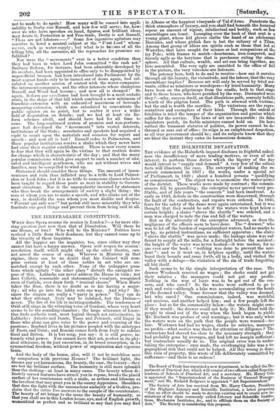THE IRREFRAGABLE CONSTITUTION.
WHEN does Opera resume its session in London ?—a far more stir- ring question just now than that of Dissolution. Will there be one House, or two? Who will be the Minister? Politics have revived a little from their deadness, but they cannot come up to the vivacity of these inquiries.
All the happier are the inquiries, too, since either way they cannot but have a happy answer. Opera will reopen its session : revolution itself, which might shut up the other theatre, can- not arrest the course of song. Whoever is Minister in that regime, there can be no doubt that his Cabinet will com- prise certain at least of those nobles in art who are ax- matched except by each other. None of the unhappier ques- tions which agitate " the other place" disturb the energetic re- pose of this. Lablache can never address the House in vain ; nor does Colletti, reasonable and statesmanlike vocalizer, recognized even of Carlyle, ever draw forth "ironical cheers." When Mario takes the floor, there is no doubt as to his having a major- ity; all who go into the lobby vote one way. And why? Be- cause the singers are really a "party in power." They can do what they attempt. Italy may be subdued, but the Italian— never. The fire of his life is inextinguishable. The tenderness of Ovid still sings in the vibrating voice of Gardoni, whose very heart seems to be the sounding-chamber ; the large utterance of Lucre- tius finds cesthetio vent, most logical though not ratiocinative, in Lablache ; Ariosto and Dante, Tasso and Petrarch, still linger in those who alone can give voice to the power and yearning of the passions ; Raphael Jives in his pictures peopled with the antetypes of Pasta and Grisi; and Rossini comes forth from Italy to subdue Gaul and Briton. It is but song, you say : it is still power, in- tensely vital power. You cannot have that art, perfect in its phy- sical utterance, in its just execution, in its broad conception, in its symmetrical freedom, without power of organization and vigorous brain.
And the body of the house, also, will it not be matchless save by comparison with previous Houses ? The brilliant light, the dresses gay yet harmonious, the beauty, the ease, the luxury—they are but the brilliant surface. The humanity is still more splendid than the clothing—at least in many cases. The beauty whose de- licately carved features have struck you in repose, breaks the placid surface of her countenance with a smile, as artless and lifesome as the loveliest that may greet you in the sunny Appenines. Shoulders that dare the light with the unconscious audacity of a Godiva, pro- claim that the entire Eve answers to the sample of the countenance. The beauty of art brings to the scene the beauty of humanity so that you shall see in this London house aye and of English gro;ith, Womankind as perfect and as brilliant t assay that you may find
in Albano or the happiest vineyards of Val d'Arno. Penetrate the thick atmosphere of luxury, and you shall find beneath the honeyed repose an amount of vigour, intellectual and bodily, such as few assemblages can boast. Lounging over the back of that seat is a young giant, whose kid gloves clothe the hand of an adolescent Hercules, and whose girlish face is but the infancy of a Titan. Among that group of idlers are spirits such as those that led at Waterloo, that have sought for science or lost companions at the icy Pole; with frames to match—heartsome, iron-tempered, and fiercely agile as the barytone that is perchance ruling the atmo- sphere. All that culture, wealth, and art can bring together, are here assembled. The very ugly are ennobled to the office of foil in the picture, the very voiceless are listeners.
The potency here, both to do and to receive—how can it survive through all the luxury, the vicissitude, and the labour, that the very assemblage implies? Because art will only be served by tried ser- vants, either as ministers or worshipers—by tried humanity. Many have been on the pilgrimage from the cradle, both to that stage and to those boxes, who have perished by the way. Decimated were they ?—why, success itself, on that illustrious path, scarcely befalls a tenth of the pilgrim band. The path is strewed with 'victims; but the end is worth the sacrifice. The victorious are the repre- sentatives and exemplars of their kind. Through the ordeal of fatalities is tried the temper of the organization and genius which suffice for the service. The laws of art are inexorable : its false legislators perish, its feeble ministers cannot hold on. Its laws outlast the transient statutes of politics, its power cannot be de- throned or sent out of office: its reign is an enlightened despotism, as all true government should be; and its subjects know that they are blest the instant they eater its harmonious domain.


























 Previous page
Previous page